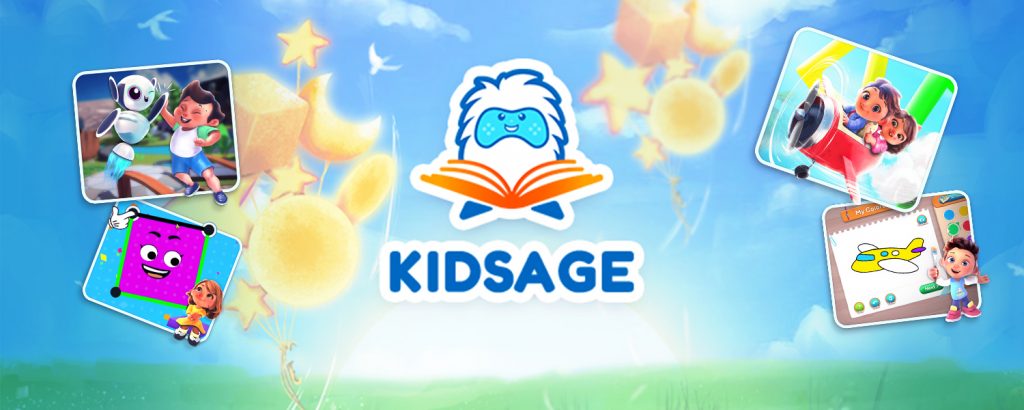Why Online Learning Games Are Crucial for Early Childhood Development?

Learning is a tedious task, but it doesn’t have to be mundane; in today’s age, interactive children’s games are helping to bridge the gap between learning and having fun. Online learning games for kids don’t just engage children in learning but also expose them to different experiences that might be missing from traditional education. The development of cognition and emotion in a child is quite essential, especially in the formative years, and the growth of society has the same level of importance. The application of technology, therefore, further facilitates these developments. Integrating online games with the learning process would create an empowered, dynamic, curious, and creative environment for a learner. The following detailed description of the advantages of online learning games and the way they affect child development during such vital years will show this outline. 1.Cognitive development At the age of 6-10, children think in concrete operations. As they age, they develop the ability to think and reason, which is Cognitive Development Online learning games are the optimum solution for enhancing cognitive development at an early age. A study published in 2022 by the National Institute of Health showed that children who played three hours of video games daily performed significantly better on cognitive thinking tests than those who did not play games. Another Indonesian study has shown that game-based learning (GBL) platforms enhance learning and learning experiences for both teachers and students. Games such as Dragonbox require juggling multiple tasks at once. Research shows that switching tasks consecutively increases brain activity in children, hence making the transition to real-world activities and learning easier and more efficient. 2.Social and emotional development Online learning games often feature multiplayer features, fostering collaboration and teamwork in the imaginations of young students. Games like minecraft stress creating through teamwork and building the self-esteem of young minds through achievement and success. Another critical component of online learning games is actively involving kids through role-plays and scenarios. These games benefit young minds by helping them develop a stronger comprehension of emotional control and the value of empathy in forming wholesome social bonds. 3.Motor skills improvement Motor skills are how the body uses muscles to perform specific tasks. Fine motor skills use smaller muscles, specifically hand and wrist muscles. These include grasping skills and eye-hand coordination. Gross motor skills use larger muscles and muscle groups. They include rolling, crawling, and walking. A study published in the Journal of Sports Science in 2023 revealed that children with Autism Spectrum Disorder (ASD) showed significant improvements in both the use of games in the classroom to develop fine and gross motor skills. Online learning games can help improve children’s motor skills. Kids playing games on a touchscreen use constant hand and finger movements; hence, dexterity is acquired in games directly linked to writing and drawing. Additionally, various games help children develop their hand-eye coordination by making them replicate their hand movements based on what is seen on the screen. Movement-based games engross and entertain children, increasing physical activity and gross motor skills. 4.Customized Learning Experiences Research in 2021 showed that 9.5% of the participants agreed that personalized learning is the optimum solution for a maximum increase in productivity and motivation in learning. The main advantage of online learning games for children is that they are tailored to suit each learner’s needs. Apps such as Kidsage make the learning process personal for the child and, as such, tempt the learner to keep on learning by spurring interest in the process. Kidsage also offers a parent dashboard for parents to keep track of their child’s progress and see what areas their child may be facing difficulty in. This allows you to supplement extra learning activities for your child in the area they might struggle with. 5.Drawbacks Although learning interactive games provide children with an easy and efficient source of knowledge, it is also essential to recognize that they might become more harmful than helpful without supervision. Prolonged use of devices can cause several issues in children, such as poor vision and posture problems. Hence, it is crucial to monitor your child’s gameplay and screen time properly; most apps offer a parental supervision mode to ensure your child’s safety. Proper research on online games, using parental controls, and reviewing the game community are some tips that can be considered. Sitting down with your child on their device is the best solution. Conclusion : To sum up, interactive learning games has many benefits. They help impart critical life skills to children and provide assurance of personalized, inclusive learning experiences. These innovative, neat tools are now accessible to parents and educators for early childhood education. It is through this that we can better prepare our future generation.
Best Online Interactive Math Games for 5th Graders

As children progress through elementary school, math becomes increasingly complex, requiring comprehension and confidence. For fifth graders, transitioning into more advanced concepts—like fractions, decimals, and basic geometry—can sometimes feel overwhelming. This is where online interactive math games come to the rescue! These resources reinforce classroom learning and boost confidence through engaging and fun formats. Let’s explore some of the best fun math games for fifth graders! Boosting Confidence with Fun Math Games One of the most significant barriers to math proficiency is anxiety. Traditional math practice can be intimidating for many students. However, interactive math games create a safe, stress-free environment that encourages exploration and learning from mistakes. Games such as Prodigy Math offer a playful approach infused with storytelling that captivates students. With instant feedback after each question, players receive immediate reinforcement, helping them build confidence in their skills. Another excellent option, Kidsage, presents a variety of games that challenge students while keeping the atmosphere light and enjoyable. These fun and engaging games make students less afraid to take risks and tackle challenging problems. Words are our most potent weapon! Studies show kids who receive verbal encouragement have boosted motivation; praise your child as they progress through their lessons! Games That Encourage Critical Thinking Critical thinking is an essential skill that transcends math and supports everyday problem-solving. Many fun mobile games are designed with mechanics that foster analytical skills. Math Playground is a perfect example, with its logic puzzles and strategy games that require students to think critically and plan their approach. These games encourage students to find answers and understand the logic behind them. Another notable mention is Kidsage, which combines a competitive environment with challenging math problems, prompting players to strategize and solve increasingly complex problems. Did you know? Books are also a great way to encourage critical thinking in children! Read a book out loud to your child and ask questions about the characters as you go to start conversations! Complementing School Learning with Interactive Games Interactive math games complement school curricula effectively. They reinforce classroom concepts while providing a different approach that may resonate better with some children. IXL provides targeted practice aligned with the school curriculum. As students encounter tough topics in class, they can turn to IXL for additional exercises that reinforce their understanding at their own pace. Additionally, KidsAge is an excellent interactive learning platform that provides various engaging math activities tailored to support fifth graders in mastering essential concepts. A parental dashboard integrated into the game will help track any math progress, ensuring you get the best experience for your children. Preparing 5th Graders for Advanced Math Concepts As fifth graders gear up for middle school math, preparing them for concepts like algebra and geometry is crucial. Fun math playground games can offer a bridge to these advanced topics in a fun and engaging way. DragonBox is highly recommended for intuitively introducing algebraic concepts. Its fun mechanics help children grasp the fundamentals of algebra without the intimidation often associated with it, without your child even feeling like they’re studying! Geometry Dash uses a fun platformer format to introduce basic geometry concepts while keeping students excited about learning new material. Supplying these fun math games with offline activities, such as scavenger hunts and DIY math games, will ensure that your children are fully geared up for advanced math concepts. Mastering Fractions and Decimals Through Fun Games Fractions and decimals often pose challenges for fifth graders. Fortunately, various games are specifically designed to make these topics more engaging and accessible. **Pizza Fraction** is an interactive game where students use pizza slices to understand fraction concepts better. Visualizing how fractions work in a real-world context allows learners to grasp these sometimes abstract ideas more easily. Similarly, **SplashLearn** offers games that focus on both fractions and decimals in a hands-on, interactive manner, allowing students to practice in a risk-free setting. Alternatively, activities like baking also deepen the understanding of fractions and decimals in 5th graders. Bake up some cookies when your child needs a break from screen time! Conclusion Engaging students with fun math games is an excellent way to supplement their learning experience. By utilizing these resources, parents and educators can help fifth graders not only master challenging math concepts but also develop a positive attitude toward math as a whole. Games like Prodigy Math, Math Playground, KidsAge, and DragonBox keep learners engaged while promoting confidence, critical thinking, and a deeper understanding of the subject. As educators and caregivers, embracing these resources could make a difference in fostering a love for math in young learners. By reinforcing what they learn in the classroom through fun and dynamic formats, we empower our children to succeed academically and enjoy the journey of learning. So, let’s encourage our fifth graders to play their way to math mastery!
Why Play-Based Learning Is Effective: A Tested Way to Help Kids Succeed

Why Play Based Learning Is Effective: A Tested Way to Help Kids Succeed Play based learning has evolved into one of many practical approaches for supporting a child’s growth and development in the constantly changing field of education. This strategy, which combines Creativity, enjoyment, and structured learning, allows kids to conceive, explore, and solve problems interestingly and naturally. But why does play-based learning work so well? In this blog, we’ll explore the studies and evidence that support this strategy and highlight how it lays the foundation for a successful future. What is Play Based Learning? Play-Based Learning: What Is It? A teaching method called “play-based learning” combines careful instruction with play. This engaging activity allows children to discover their passions, develop critical thinking skills, and learn about the world. Key Elements of Play-Based Learning: Play-based learning focuses on the whole child, nurturing cognitive, social, emotional, and physical development. The Science Behind Play-Based Learning 🧠🔬 Numerous studies have demonstrated the profound impact of play-based learning on child development. Let’s look at the research: A 2016 study published in the journal Early Childhood Research Quarterly found that children engaged in play-based learning showed improved problem-solving, critical thinking, and language development compared to traditional learning environments. How It Works: Play provides opportunities for children to interact, negotiate, and collaborate with others. The American Academy of Pediatrics highlights that play-based learning teaches children how to regulate emotions, build empathy, and communicate effectively. Proof in Action: Play-based learning fosters intrinsic motivation, meaning children engage in activities because they find them enjoyable, not because they’re being forced to. This builds a lifelong love of learning, which is key to academic success. Research Insight: A study by Cambridge University showed that children who experienced play-based early education were more likely to remain engaged and curious throughout their schooling years. Play-Based Learning vs. Traditional Methods 📚⚡ Unlike traditional education models, which often focus on rote memorization and rigid schedules, play-based learning emphasizes active participation and exploration. Here’s how the two approaches differ: Aspect Traditional Learning Play-Based Learning Teaching Style Teacher-led, structured lessons Child-led, guided exploration Focus on Academic outcomes Holistic development Engagement Passive (listening, writing) Active (playing, experimenting) Benefits Test-focused learning Creativity, problem-solving, and collaboration Real-Life Benefits of Play-Based Learning 🌟 Countries like Finland, known for their play-based early education systems, consistently rank among the top in global education metrics. Finnish children, who begin formal academics later but engage in extensive play, outperform peers in literacy, numeracy, and problem-solving. A child’s early experiences with learning shape their relationship with education. Play-based learning reduces stress and fosters a positive attitude toward school. Example: A 2021 study found that play-based preschoolers were less anxious and more excited about transitioning to formal schooling than their peers in traditional programs. How Parents Can Support Play-Based Learning at Home 🏡 You don’t need a classroom to embrace play-based learning! Here are simple ways to incorporate it into your daily routine: Conclusion: Why Play-Based Learning Works 🎉 Play-based learning is more than just enjoyable; it’s a powerful educational tool that provides children with the skills they need to succeed. Supported by scientific research and demonstrated through real-world examples, this approach fosters cognitive, social, and emotional development in ways that traditional methods often cannot. By embracing play-based learning—whether at home, school, or through platforms like KidsAge—parents and educators can help children unlock their full potential. FAQs About Play-Based Learning Q: What age is play-based learning suitable for? A: Play-based learning is ideal for children aged 2–8, but its principles can also be adapted for older children. Q: Does play-based learning prepare kids for formal schooling? A: Yes! Studies show that children who engage in play-based learning transition more smoothly into formal education and perform better academically. Q: Can play-based learning happen online? A: Absolutely! Digital platforms like gamified learning apps combine play and education effectively.
10 Ways to Make Math Fun for Kids with Interactive Learning Games

Math often gets a bad rap as a subject that can be dull or intimidating for kids. However, there are plenty of methods to transform math learning into an exciting adventure filled with creativity, movement, and collaboration. Here are some fantastic interactive learning games that can ignite a love for math in children. 1. Gamified Learning Platforms Learning through traditional methods is out of style. Nowadays, gamified learning platforms are innovating and changing the game. Gamification is a method of innovative teaching that mixes game elements such as puzzles and rewarding systems into mundane studying, ensuring your child stays engaged! Fun educational games for kindergarteners like Prodigy, Kidsage, and Khan Academy are the leaders in making innovative game-based learning platforms suitable for all ages! Children who play mind games develop skills such as strategic thinking, planning, generating alternative solutions, reasoning, and gaining different perspectives. Another study examining the impact of the mind games lesson on child achievement concluded that the problem-solving and reasoning skills of children taking those lessons improved. 2. Virtual Math Escape Rooms Virtual escape rooms for children are exciting and interactive games that encourage young minds to solve puzzles and complete fun tasks in a virtual setting that mimics the experience of physical escape rooms. These games are crafted to be age-appropriate and test various skills such as critical thinking, creativity, and teamwork. They provide a safe and engaging way for kids to work together, think outside the box, and celebrate their achievements as they unlock new challenges. Using a tool like Room Escape Maker is perfect for custom-tailoring an interactive kids’ learning experience that is right for your child. 3. DIY Math Board Games One key benefit of hands-on learning is that it encourages engagement and participation. When kids can physically interact with the material they are studying, they are more likely to pay attention, which helps develop their long-term memory. Additionally, hands-on activities break up the monotony of traditional lecture-style learning, which can often be boring for many children. https://www.youtube.com/watch?v=uOc2cT_-coM Themes are a great way to add a spin to these math games, so here are our top tips! – Addition Adventure**: Players solve addition problems to move along a treasure map. – Multiplication Mania is a racing game where players answer multiplication questions to speed ahead of opponents. – Geometry Quest**: Players answer questions about shapes and angles to navigate a maze. Whether you’re competing for the win or collaborating to solve tricky problems, the laughter and joy shared around the table will be what everyone remembers most. 4. Math Scavenger Hunt Scavenger hunts are a beloved activity among kids, and incorporating math into this format can make it even more enjoyable. Design math-related clues and tasks that require kids to solve problems to find their next item or destination. This approach combines physical movement with mental challenges, creating an engaging experience that promotes teamwork and critical thinking. 5. Math Playground Fun Challenges In today’s digital age, online platforms offer a variety of interactive learning games that can be both educational and entertaining. Kids can participate in quizzes and timed challenges that sharpen their skills and encourage friendly competition and collaboration. By incorporating these activities into their routine, learning math can become an exciting game rather than a chore. 6. Interactive Learning Games with Augmented Reality Augmented Reality (AR) is a groundbreaking educational tool that can significantly enhance students’ understanding of math concepts. By providing visualization through immersive experiences, AR allows children to interact with mathematical ideas in real time. Several apps are available that harness AR technology to create engaging learning experiences, turning abstract concepts into tangible adventures. 7. Story-Based Math Games The power of storytelling is undeniable in education. Integrating math problems within engaging narratives can enhance children’s understanding and retention of concepts. By crafting story-based math games, kids can see real-world applications of their learning, making math feel relevant and exciting. Think of scenarios that pose mathematical challenges as part of the story, encouraging kids to solve problems to progress the narrative. 8. Math Relay Races Math relay races merge the thrill of competition with physical activity. Organize teams and structure races where participants solve math problems at each station before moving on to the next leg. This promotes teamwork and adds fun and excitement to solving math problems, transforming the learning process into a dynamic and interactive experience. 9. Interactive Math Journals Encouraging personal expression can significantly deepen the learning experience. Interactive math journals allow kids to draw, reflect, and solve problems creatively. They can use their journals to explore concepts through sketches, stories, or personal insights, fostering a deeper understanding of math. Free templates online can enhance your experience with math journals, here’s our top pick: https://www.teacherspayteachers.com/browse?search=math%20journal%20template 10. Math Quest Adventures Adventure-themed learning experiences captivate children’s interests while providing educational content. Develop quests that integrate math challenges throughout the Adventure. These quests can take various forms, from treasure hunts to hero journeys, ensuring that children engage with math in a fun and immersive manner. Conclusion Making math fun is essential for creating a positive learning experience. As parents and educators, we can embrace creative strategies like scavenger hunts, interactive games, and storytelling to inspire enthusiasm for math in children. It’s time to ignite a love for math by trying these activities and watching kids transform into eager learners, ready to tackle mathematical challenges with joy and confidence. Let’s embark on this math adventure together!
Instruction to use Kidsage (for parents & children – all required informations)

Welcome to Kidsage: Where Fun Meets Learning In today’s fast-paced digital world, parents are constantly searching for tools that provide a safe, engaging, and educational environment for their children. Kidsage is here to bridge that gap, offering a game-based learning platform designed specifically for children aged 4-9. Our mission is to make learning an adventure, where children can grow intellectually while enjoying themselves in a secure digital playground. How To: A Step-by-Step Guide Learning has never been so much fun! Kidsage transforms everyday lessons into magical adventures filled with games, puzzles, and rewards. Here’s why kids love Kidsage: Pricing At Kidsage, every subscription begins with a 7-day free trial, allowing you to explore all premium features at no cost before committing. Choose the plan that works best for your family: With the 7-day free trial included in both plans, you can confidently experience Kidsage before your subscription begins. Start your child’s learning adventure today! For Parents: Empowering You with Peace of Mind At Kidsage, we understand the challenges parents face in ensuring their children have access to quality educational resources while staying safe online. Here’s how we cater to your needs: For Children: Adventures That Spark Curiosity Learning has never been so much fun! Kidsage transforms everyday lessons into magical adventures filled with games, puzzles, and rewards. Here’s why kids love KidsAge: Why Choose Kidsage? Join the Kidsage Family Today Whether you’re a parent looking for a safe learning app or a child ready to embark on an educational adventure, Kidsage is the perfect companion. Download the app now and unlock the doors to a world of fun, discovery, and growth. Let’s shape the future, one game at a time. Connect With Us Stay updated on new features, games, and resources: Website: Kidsage Youtube: Kidsage Facebook: Kidsage TikTok: @Kidsage Together, let’s make learning a joyous experience for every child!